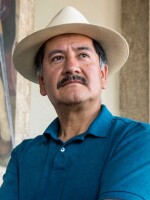Leo Brouwer is considered one of the most important living figures of classical music in Latin America. His works are played regularly in concert halls around the world, and he's scored more than 50 films. But at the age of 78, Brouwer finds it hard to reflect on his legacy. He's just grateful that people are moved by his music.
"To be useful is something incredible, because you're at the service of the world," Brouwer says in Spanish. "Humans, when they communicate, when they teach, when they show, when they give ... they're doing one of the most beautiful things in life ... Perhaps my roots in solitude, of being an orphan — it forces me to these reflections."
His parents divorced when he was very young, and his mother died when he was 11. So he decided to go look for his father.
"I found him playing a guitar, and it was the instrument that fascinated me," he says.
Brouwer taught himself everything he knows about music. Even though his grandmother was the sister of renowned composer Ernesto Lecuona, the wealthy family refused to pay for any kind of music education and wanted nothing do to with him.
"I'd say that being in an orphanage made me reflect on the 'what' and the 'why' — especially the 'why' — of the essential things in life," he says. "What is a man? What am I doing here? What is culture? Why am I fascinated with this?"
Brouwer says he listened to Cuba's classical radio station all the time and learned how to read sheet music by haunting music stores in Havana when he was 15 years old.
"I arrived and showed my clean hands, so I could touch the sheet music. 'Sure, come on in, boy,' they'd say. I spent four hours a day standing, studying Stravinsky, including one of Mozart's string quartets, who was one of my first teachers of the traditional forms ... That's the world in which I began to compose," he says. "I didn't have a piano, I don't need it. I trained the ear and I wrote on the table. And I still write music that way. The guitar was a reference, for fingerings and things like that."
Brouwer's models were Bartok, Schumann, Rachmaninov and Stravinsky. He wanted to do for the guitar what they had done for instruments like piano and violin.
Brazilian guitarist Carlos Barbosa-Lima first heard Brouwer's music when he was touring in Europe, in the early 1970s.
"For me it was a new experience, because I saw a composer-guitarist with incredible view of the music and different styles too, including the popular roots, and also his knowledge," Barbosa recalls. "I think probably he had his style, when he was in his teens, already defined."
Part of that style is incorporating traditional music and Cuban instruments in classical music forms. But Brouwer is also a big fan of popular music and says it's just as important as anything written for the concert hall.
"That's the case of The Beatles, among others, or a Leonard Cohen. So many. Including those that could be labeled commercial," Brouwer says. "The composers of boleros from Cuba and Mexico are absolute geniuses ... Those boleros they wrote will transcend history because they're incredible."
Brouwer has a special place in his heart for The Beatles. He decided to arrange their music for classical instruments because of a particular Cuban minister of culture and his views on music.
"He even felt North American music deformed people. That view was widespread during the old Soviet era, that some music was degenerate, that it was a Nazi heritage," Brouwer explains. "That minister banned my music, too, and that of composer Silvio Rodriguez, who was a hard-core revolutionary. We were forbidden, we became close friends, and here we are. The minister is long gone."
In addition to his prolific career as a composer, Brouwer also founded important cultural institutions in Cuba. In 1960, he created the Cuban Institute of Art and Film Industry and helped organize the conservatories on the island. He stopped playing the guitar in the late '70s, after an accident permanently damaged the middle finger of his right hand. Today, he focuses all of his energy on composing, noting that he still has a lot of work to do.
"And now I have many more ideas. The problem is much more serious," he says. "It's a lot harder to compose — not because I don't have ideas, but because I have too many ideas ... and I have to be selective."
Copyright 2022 NPR. To see more, visit https://www.npr.org.



